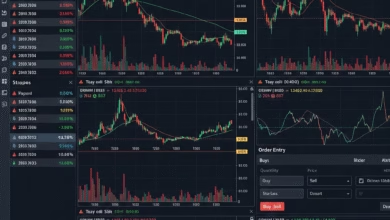How to Start Investing in the Stock Market with Little Money
Learn how to start in the stock market even with little money

Many people believe that investing in the stock market is only for the wealthy. However, that’s a common misconception. Thanks to advancements in technology and changes in the financial industry, it’s now more accessible than ever to start investing in the stock market with little money. You don’t need thousands of dollars to begin your journey towards building wealth.
Smart Ways to Enter the Stock Market with a Small Budget

Here are several effective strategies for individuals looking to start investing in the stock market without breaking the bank:
- Fractional Shares: Owning a Piece of the Pie: Traditionally, you had to buy whole shares of a company’s stock. Now, many brokerage platforms offer fractional shares. This means you can invest as little as $1 or $5 to own a portion of a share, even for high-priced stocks. This opens up opportunities to invest in companies you believe in, regardless of their individual share price.
- Exchange-Traded Funds (ETFs): Instant Diversification on a Budget: Exchange-Traded Funds (ETFs) are investment funds that trade on stock exchanges, similar to individual stocks. Many ETFs track a specific index (like the S&P 500), sector, or investment strategy. They offer instant diversification, spreading your investment across multiple assets, and often have low expense ratios. You can typically buy shares of ETFs for relatively low prices.
- Low-Cost Index Funds: Simple and Affordable Investing: Index funds are a type of mutual fund that aims to match the performance of a specific market index, such as the Dow Jones Industrial Average or the Nasdaq Composite. They generally have very low expense ratios, making them a cost-effective way to gain broad market exposure. Many brokerage accounts allow you to invest in index funds with minimal initial investment.
- Utilize Brokerage Platforms with No or Low Minimums: Research and choose online brokerage platforms that have no minimum deposit requirements or very low minimums to open an account. Many of these platforms also offer commission-free trading for stocks and ETFs, reducing your initial investment costs.
- Reinvest Dividends: Grow Your Investments Automatically: If the stocks or ETFs you own pay dividends (a portion of the company’s profits distributed to shareholders), consider reinvesting those dividends. This means using the cash payouts to automatically buy more shares, allowing your investments to grow over time through compounding.
- Start Small and Be Consistent: The key to successful investing, especially when starting with little money, is consistency. Even small, regular investments can add up significantly over the long term due to the power of compounding. Set a budget for how much you can realistically invest regularly, whether it’s weekly or monthly, and stick to it.
Essential Steps Before You Start Investing

Before you dive into the stock market, even with a small amount, it’s crucial to take these fundamental steps:
- Educate Yourself: Understand the basics of the stock market, different types of investments, and the associated risks. There are numerous online resources, books, and courses available for beginners.
- Define Your Financial Goals: What are you investing for? Retirement, a down payment on a house, or another long-term goal? Having clear goals will help you choose appropriate investments and stay motivated.
- Assess Your Risk Tolerance: How comfortable are you with the possibility of losing money in the short term? Your risk tolerance will influence the types of investments you choose.
- Open a Brokerage Account: Select a reputable online brokerage platform that suits your needs, considering factors like fees, minimums, investment options, and user-friendliness.
- Create a Budget: Determine how much you can realistically afford to invest regularly without impacting your essential expenses and emergency fund.
- Build an Emergency Fund: Before investing, ensure you have a readily accessible emergency fund to cover unexpected expenses. This will prevent you from having to sell your investments prematurely during a financial hardship.
The Power of Compounding: Making Your Small Investments Grow

One of the most powerful forces in investing is compounding. This is the process where the earnings from your investments (like dividends or capital gains) also start earning returns. Over time, even small, consistent investments can grow significantly due to the snowball effect of compounding. The earlier you start, the more time your money has to grow.
Taking Your First Steps Towards Stock Market Investing
Investing in the stock market doesn’t require a large initial investment. By leveraging fractional shares, ETFs, low-cost index funds, and platforms with low or no minimums, you can begin building your investment portfolio with a small budget. The key is to educate yourself, set clear goals, understand your risk tolerance, and be consistent with your investments. Start small, stay disciplined, and let the power of compounding work for you over the long term.





